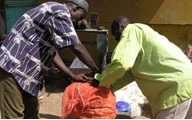
Increasing Productivity and Profitability for Resettled Farmers in Northern Segou
ACDI/VOCA provided key agricultural services in the three-year program funded by the Millennium Challenge Account (MCA) in Mali. Through the Agriculture Development Systems Activity (ADSA), based in northern Segou, ACDI/VOCA helped the region’s villages develop greater productivity and profitability by training 1,030 livestock herder families in the practice of sedentary rice farming, irrigation system management, producer organization and agriculture credit management.
The inhabitants of the region have lived for centuries as seminomadic cattle herders. In years of poor rainfall they risk drastic losses of their animal herds, on which they depend for survival. The ADSA project helped them transition from a subsistence lifestyle into commercial agriculture, resulting in family economic stability and regional food security. In May 2010, the project facilitated the resettlement, of the village of Beldenadji, which has a population of 830. Beldenadji was the first of 33 villages that were targeted to relocate to their new village site near Diabaly. Each of the resettled families received title to five hectares of irrigated land, new housing and improved access to fresh water supplies, primary education for children, and health clinics.
A total of 200 families were resettled in 2010 to begin rice cultivation on 1,000 hectares of new, irrigated land in the MCA Alatona zone. ACDI/VOCA organized the distribution of agricultural starter kits to ensure success for first-time rice farmers. The kits included oxen, plowing equipment, wagons, fertilizer and certified seed. ACDI/VOCA also provided kits for a second dry season vegetable crop exclusively for women farmers. In addition to rice, farmers explored markets for shallots, potatoes and forage crops for livestock feed. An additional 830 families were resettled in 2011 on 4,150 hectares of land in the Alatona zone.
ADSA created long-term farm sustainability by
- building farmers’ ability to produce irrigated rice and other products (vegetable and animal) in order to better operate in a commercial market system;
- promoting the establishment of self-sustaining producer organizations that provide services to increase the productivity and incomes of their members;
- increasing access to financial services through existing microfinance institutions to help farmers and households increase productivity and revenue now and in the future; and
- building producers’ capacity in water management and maintenance of water canal networks.


